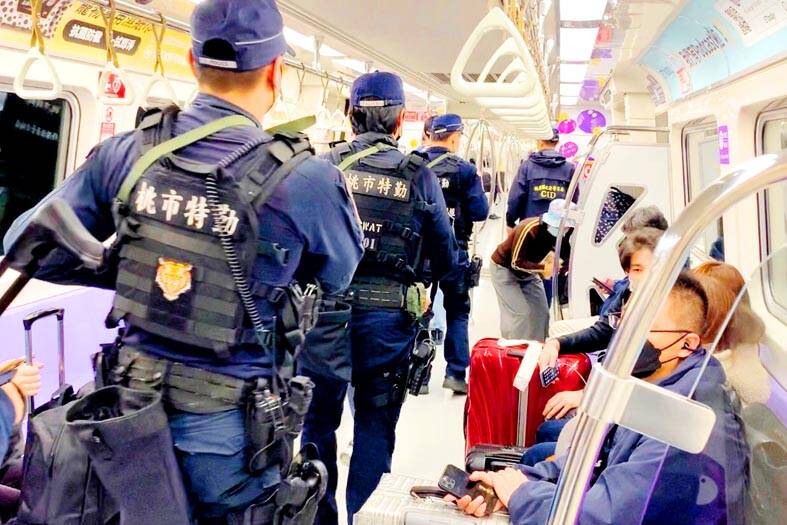A Chinese national who previously studied in Taiwan is believed to be behind as many as 150 threatening messages sent to government offices and public transportation systems in Taiwan in the past few years, the Criminal Investigation Bureau (CIB) said on Monday.
Democratic Progressive Party Legislator Chuang Jui-hsiung (莊瑞雄) asked a hearing at the legislature in Taipei what law enforcement was doing about disruptions allegedly caused by the suspect, whom authorities have identified as Zhang Haichuan (張海川).
The threats have wasted police time and might be a form of Chinese “cognitive warfare,” Chuang said, adding that the government needs a better standard operating procedure to respond to such incidents.

Photo: CNA
Since September 2021, Zhang is believed to have e-mailed bomb threats to Taiwan High Speed Rail, the Taipei MRT and Taoyuan Airport MRT, among others, while also sending threatening messages to government institutions, including the Presidential Office and the Executive Yuan.
CIB information shows that police have referred Zhang to the Taichung District Prosecutors’ Office over his alleged involvement in 68 separate threats, although prosecutors now believe the actual number could be closer to 150.
Zhang, a native of China’s Zhejiang Province, from 2016 to 2021 studied at Providence University in Taichung and the graduate school at National Taiwan University of Technology in Taipei.
After a fellow Chinese student reportedly rejected his romantic advances, he allegedly sent a threat targeting the institution she attended, leading to his arrest on suspicion of criminal intimidation.
Prosecutors questioned and later pressed charges against Zhang, but did not prevent him from leaving the country.
He returned to China in July 2021.
Possibly because of the charges against him, after returning to China, Chang allegedly began sending threats to Taiwan’s government and transportation network, many using the same pseudonym, similar language, and a virtual private network to mask his Internet protocol address and location.
Minister of the Interior Lin Yu-chang (林右昌) told the hearing that he had instructed the National Police Agency to develop a mechanism to respond to the impact of threats such as those allegedly sent by the suspect.
National Police Agency Director-General Huang Ming-chao (黃明昭) said that the agency had contacted Chinese authorities about the charges against Zhang, but added that there would be “some difficulty” bringing Zhang to Taiwan to face trial.
While Taiwan and China have cooperated on combating crime in the past, both have typically adhered to the principle of not turning over their own citizens to the other side.

SECURITY: As China is ‘reshaping’ Hong Kong’s population, Taiwan must raise the eligibility threshold for applications from Hong Kongers, Chiu Chui-cheng said When Hong Kong and Macau citizens apply for residency in Taiwan, it would be under a new category that includes a “national security observation period,” Mainland Affairs Council (MAC) Minister Chiu Chui-cheng (邱垂正) said yesterday. President William Lai (賴清德) on March 13 announced 17 strategies to counter China’s aggression toward Taiwan, including incorporating national security considerations into the review process for residency applications from Hong Kong and Macau citizens. The situation in Hong Kong is constantly changing, Chiu said to media yesterday on the sidelines of the Taipei Technology Run hosted by the Taipei Neihu Technology Park Development Association. With

CARROT AND STICK: While unrelenting in its military threats, China attracted nearly 40,000 Taiwanese to over 400 business events last year Nearly 40,000 Taiwanese last year joined industry events in China, such as conferences and trade fairs, supported by the Chinese government, a study showed yesterday, as Beijing ramps up a charm offensive toward Taipei alongside military pressure. China has long taken a carrot-and-stick approach to Taiwan, threatening it with the prospect of military action while reaching out to those it believes are amenable to Beijing’s point of view. Taiwanese security officials are wary of what they see as Beijing’s influence campaigns to sway public opinion after Taipei and Beijing gradually resumed travel links halted by the COVID-19 pandemic, but the scale of

A US Marine Corps regiment equipped with Naval Strike Missiles (NSM) is set to participate in the upcoming Balikatan 25 exercise in the Luzon Strait, marking the system’s first-ever deployment in the Philippines. US and Philippine officials have separately confirmed that the Navy Marine Expeditionary Ship Interdiction System (NMESIS) — the mobile launch platform for the Naval Strike Missile — would take part in the joint exercise. The missiles are being deployed to “a strategic first island chain chokepoint” in the waters between Taiwan proper and the Philippines, US-based Naval News reported. “The Luzon Strait and Bashi Channel represent a critical access

Pope Francis is be laid to rest on Saturday after lying in state for three days in St Peter’s Basilica, where the faithful are expected to flock to pay their respects to history’s first Latin American pontiff. The cardinals met yesterday in the Vatican’s synod hall to chart the next steps before a conclave begins to choose Francis’ successor, as condolences poured in from around the world. According to current norms, the conclave must begin between May 5 and 10. The cardinals set the funeral for Saturday at 10am in St Peter’s Square, to be celebrated by the dean of the College